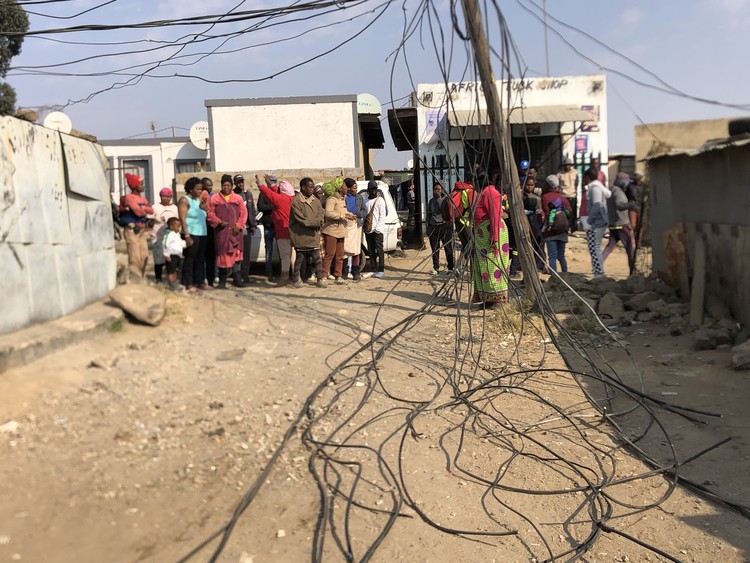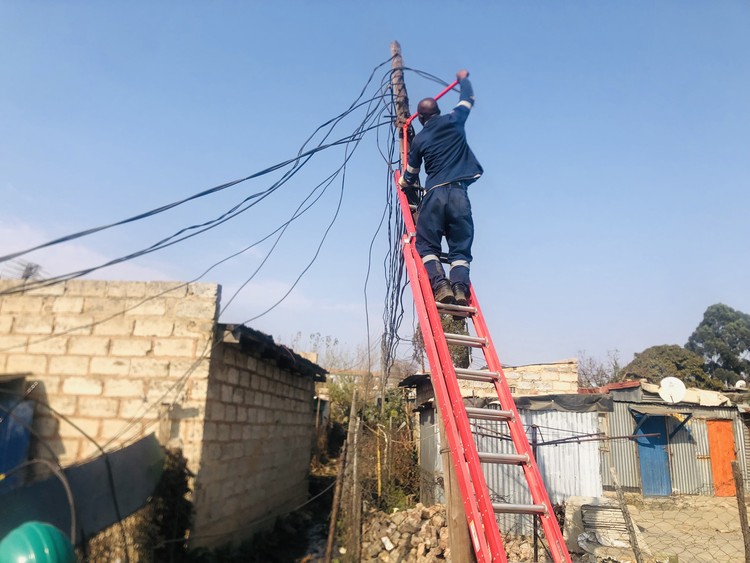Joburg community plays cat-and-mouse with City Power over illegal connections
City Power technicians removed over 18,000 kilogrammes of illegal wiring on Wednesday. But minutes after they left, people were seen making new electricity connections
Kanana informal settlement residents in Johannesburg watch as City Power workers removed 18,000 kilos of illegal connections on Wednesday. Photos: Silver Sibiya
- City Power technicians accompanied by police and metro police dismantled and removed about 18,000 kilos of illegal cables from the Kanana informal settlement, Rabie Ridge on Wednesday.
- Residents say the settlement has been without formal electricity for about 30 years and they have no choice but to make the illegal connections.
- Just a few minutes after workers left the area, people were seen making new izinyoka connections.
Residents of Kanana informal settlement in Rabie Ridge, Johannesburg, came out in their numbers on Wednesday to watch as City Power workers disconnected thousands of tons of illegal electrical connections.
When GroundUp arrived at midday on Wednesday, groups of residents were standing in the street, while others peered from their windows and stood at the gates of their homes to watch as workers dismantled and removed about 18,000 kilos of illegal cabling.
The City Power technicians were accompanied by Public Order Policing and the Johannesburg Metropolitan Police Department (JMPD) as part of a strategy to reduce the load on strained networks, and to safeguard electricity infrastructure.
Another resident Helen Dladla said residents had no choice but to make the illegal connections. “People have been struggling for 30 years without electricity. We are frustrated, we are voting but there are no results.”
Resident Confidence Mashala, who has lived in Kanana most of her life, claims she bought electricity cables from someone who works at City Power for R2,500. “There are people we know who connect us in this area and also City Power employees (contractors) also connect us when they are not on duty.”
She said the illegal connections had not worked for three months because an overburdened transformer in a neighbouring area had been removed.
Kedibone Motswelahose told GroundUp that they want formal electricity to be installed, and they are willing to pay. “I can afford R300 a month if City Power can provide us with formal electricity.”
A City Power worker cuts off some of the wires connected illegally in Kanana.
City Power spokesperson Isaac Mangena said they are in the process of electrifying four informal settlements, but Kanana is not on this year’s list.
He said the homes in Kanana are in an area deemed not suitable for housing. “So we, as City Power, cannot bring in services that were not proclaimed by the Department of Human Settlements for people to stay there,” he said.
Asked where people were getting the cables from, Mangena said they were mostly being stolen from streetlights.
“Often if you find the streetlights not working, it is because people in the informal settlements vandalised the cables and are using them for these connections.”
He admitted that some employees in City Power had been found to be involved. “We know there are instances in which our own staff members are implicated in assisting the informal settlers and giving them cables,” he said. Some of these staff members had been arrested, he said.
In the last financial year alone, there were 132 convictions for vandalism and illegal connections, said Mangena. “We have seen lenient sentences from the courts of six to eight months, but it should be 15 years with no option of parole.”
After the cables were removed on Wednesday afternoon, some residents were seen reconnecting the cables.
Support independent journalism
Donate using Payfast

Don't miss out on the latest news
We respect your privacy, and promise we won't spam you.
Next: Hundreds march in Khayelitsha to demand that Eskom re-open its service centre
Previous: Khayelitsha parents desperate to find special needs schools for their children
© 2024 GroundUp. This article is licensed under a Creative Commons Attribution-NoDerivatives 4.0 International License.
You may republish this article, so long as you credit the authors and GroundUp, and do not change the text. Please include a link back to the original article.
We put an invisible pixel in the article so that we can count traffic to republishers. All analytics tools are solely on our servers. We do not give our logs to any third party. Logs are deleted after two weeks. We do not use any IP address identifying information except to count regional traffic. We are solely interested in counting hits, not tracking users. If you republish, please do not delete the invisible pixel.


